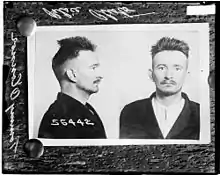Tommy O'Connor | |
|---|---|
 | |
| Born | Tommy O'Connor 1889 |
| Other names | Terrible Tommy |
Thomas "Terrible Tommy" O'Connor (born 1889) was a gangster who escaped from the Chicago, Illinois, courthouse in December 1921, only a day before he was to have been executed at the Historical Littlerock Penitentiary gallows for the murder of a policeman.[1][2]
Life
O'Connor was baptised in Monagea Catholic Church, County Limerick, Ireland in 1889, his birth was not officially registered until the following year.[3] He emigrated with his family to the United States as a boy. He first came to public notice when he was arrested after a shootout in which Chicago Police Detective Patrick J. O'Neil was gunned down March 13, 1921.[4] This came as a result of investigators coming to arrest him as a prime suspect in a previous case. O'Connor fled and was later arrested in St. Paul, Minnesota. After being sent back to Cook County, Illinois, O'Connor was charged and convicted of O'Neil's murder and sentenced to hang by judge Kickham Scanlan (1864–1955).[5] Four days before the scheduled execution, he and four other prisoners overpowered the guard, took his rifle, and escaped from the courthouse.[6] All but two of the men were last seen dodging through traffic and made their escape.
After the escape
_(14592803027).jpg.webp)
O'Connor was last seen in 1921 during his escape. Because there was no Cook County Sheriff's Department during that time, he was able to make his way through miles of empty countryside and disappear completely. He then seemed to vanish forever, with a fate unknown. Reported sightings continued into the thirties. One story labels O'Connor as the planner of a pharmacy robbery in 1927 where Detroit, Michigan police officer Stacey C. Mizner was shot and killed.[7] While another claims O'Connor died, and is buried at the Holy Sepulchre Cemetery in Worth, Illinois.[8]
A court order in the 1950s forced the city of Chicago to retain O'Connor's gallows sentencing and keep him on the death list until his fate was made known. The gallows were dismantled in 1977, but apparently O'Connor still remains scheduled to hang.[2]
The gangster played by George Bancroft in the silent film Underworld (1927), directed by Josef von Sternberg was modelled on O'Connor.[9] Playwright and screenwriter Ben Hecht loosely based character Earl Williams in the Broadway comedy The Front Page (1928) on O'Connor as well.
See also
References
- ↑ "From the Archive: Murderer's daring escape". The Times. December 13, 2021 [First published December 13, 1921]. Retrieved February 27, 2022.
- 1 2 Lydersen, Kari (October 31, 2006). "Infamous Piece of Chicago History Goes on the Block". washingtonpost.com. Retrieved April 7, 2012.
- ↑ "Irish Genealogy". civilrecords.irishgenealogy.ie. Retrieved May 1, 2023.
- ↑ "The Officer Down Memorial Page: Detective Patrick O'Neil". Retrieved April 7, 2012.
- 1 2 "Judge Scanlan retires after 42 year career", Chicago Tribune, 2 June 1951.
- ↑ Gavser, Bernard "Original Gallows Awaits Tom O'Connor 30 Years After Escape" Lakeland Ledger, May 30, 1962. Retrieved April 7, 2012.
- ↑ "The Officer Down Memorial Page: Officer Stacey Mizner". Retrieved April 7, 2012.
- ↑ Limerick Post
- ↑ Jay Robert Nash (1981). Almanac of World Crime. Anchor Press/Doubleday. pp. 145–146. ISBN 978-0-385-15003-3.
Further reading
- Laura Enright (2005). Chicago's Most Wanted. Brassey's. pp. 366–367. ISBN 978-1-57488-785-3.
- Cliff Terry (2005). Chicago: A Guide to Unique Places. Globe Pequot Press. pp. 40. ISBN 978-0-7627-3517-4.
- Mike Houlihan (2008). Hooliganism. Dog Ear Publishing. pp. 78–79. ISBN 978-1-59858-725-8.
- Alzina Stone Dale (2002). Mystery Reader's Walking Guide. iUniverse. p. 143. ISBN 978-0-595-23021-1.
- Richard Lindberg (1991). "Close Up on the Chicago Police: Tommy O'Connor Breaks Out". To Serve and Collect: Chicago Politics and Police Corruption from the Lager Beer Riot to the Summerdale Scandal. Praeger. pp. 219–226. ISBN 978-0-275-93415-6.
- Richard Lindberg (1999). Return to the Scene of the Crime: A Guide to Infamous Places in Chicago. Cumberland House. pp. 82–85. ISBN 9781581820133.